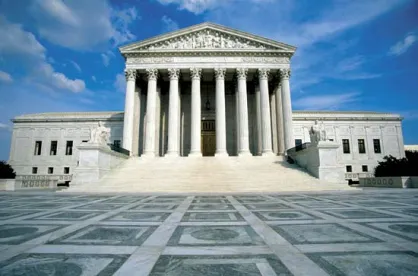On Monday, the United States Supreme Court held Title VII’s requirement that an employee-plaintiff file an administrative charge with the Equal Employment Opportunity Commission (EEOC) before filing in court is a procedural, not a jurisdictional, requirement. Thus, if a defendant does not timely raise the issue, it can be forfeited. Justice Ruth Bader Ginsburg authored the unanimous opinion of the Court.
By way of background, Title VII of the Civil Rights Act of 1964 prohibits discrimination in employment on the basis of race, color, religion, sex, or national origin. 42 U.S.C. § 2000e-2(a)(1). Before commencing a Title VII action in court, an employee-plaintiff must file a charge with the EEOC and receive a “right-to-sue” notice. Upon receipt of the notice, the employee may commence a civil action against his or her employer. See § 2000e-5(e)(1), (f)(1).
In the underlying case, the employee-plaintiff, Lois M. Davis filed a charge with the EEOC against her employer, Fort Bend County, alleging sexual harassment and retaliation for reporting the harassment. Sometime later, Davis attempted to add an allegation for religious discrimination by handwriting “religion” on an “intake questionnaire” form. She failed, however, to amend her formal charge document. After receiving her right-to-sue letter, Davis commenced a lawsuit alleging discrimination on the basis of religion and retaliation for reporting sexual harassment. After years of litigation, Fort Bend County asserted for the first time that the District Court lacked jurisdiction to adjudicate Davis’ religion-based discrimination claim because her EEOC charge did not list such a claim. The District Court agreed and dismissed Davis’ suit. On appeal, however, the Court of Appeals for the Fifth Circuit reversed.
In affirming the Fifth Circuit’s decision, the Supreme Court noted true jurisdictional requirements are quite rare and held “Title VII’s charge-filing requirement is not of jurisdictional cast.” Instead, the Court noted, “Title VII’s charge-filing provisions ‘speak to . . . a party’s procedural obligations.’” As such, the Court held, “Title VII’s charge-filing requirement is a processing rule, albeit a mandatory one, not a jurisdictional prescription delineating the adjudicatory authority of courts.” According to the Court, “a rule may be mandatory without being jurisdictional, and Title VII’s charge-filing requirement fits that bill.”
In light of the Court’s ruling, employers must timely assert any defense based on the administrative charge-filing requirement or risk forfeiture of that argument. Unfortunately, the Court’s ruling does not specify when such arguments will be deemed timely raised. Thus, the argument should be raised as soon as practicable in a responsive pleading.




 />i
/>i
